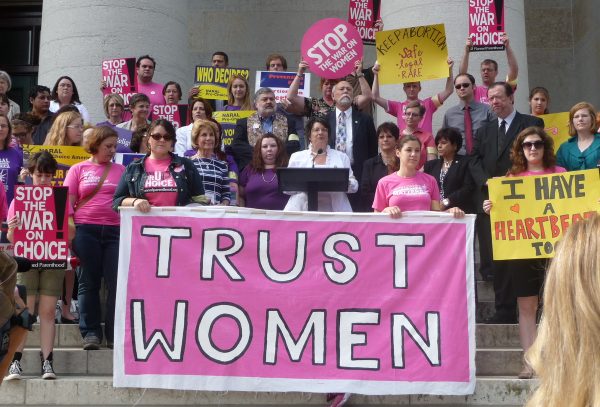
The debate regarding abortion continues to be one of the most divisive and debated topics in American society. However, underlying every conversation is the key principle of the individuals’ right, specifically women, to make their own decisions about their bodies. Defending access to abortion is essential, both as a matter of personal liberty and public health.
The choice to continue or terminate a pregnancy is an extremely personal one, and every woman should have the right to make this decision based on their circumstances and values. Forcing women to carry unwanted pregnancies strips them of control over their own lives and also discards any factors influencing potential decisions–finances, health risks, personal goals, and readiness to take this step. Lawmakers and judges are not fit to determine what the best thing to do is for each individual.
Restricting access to abortion does not suddenly remove the need for it, but instead makes this procedure more dangerous. Women often turn to unsafe or illegal methods to carry out abortions, putting their own lives at severe risk. According to the National Institutes of Health, 42 million women with unexpected pregnancies choose abortion. 20 million of these are unsafe, and about 68,000 women die annually due to unsafe abortion. Forcing women to bear children as a punishment or consequence for promiscuity is ridiculous. In fact, according to the Tulane School of Health and Tropical Medicine, there has been a 7% increase in maternal mortality rates in abortion-restrictive states since the overturning of Roe V Wade. The life of an unborn child shouldn’t come at the cost of, or even take precedence over, their mother’s, especially if the pregnancy was unwanted in the first place.
Furthermore, abortion access is seen as a key component of gender equality. The power to make these decisions about reproduction directly impacts not only a woman’s autonomy but also the ability to fully engage in society as well as limit economic opportunities. When women are denied this right, they are forced into situations that can have lasting effects on their lives. For instance, educational pursuits and career progression can be hindered or disrupted. With no control over reproductive choices, women do not have the agency to plan for their own futures. Reproductive rights are vital to creating and maintaining an equitable society and promoting women’s empowerment.
Those criticizing abortion believe that it is morally wrong and violates life’s devotion. Anti-abortion supporters argue that the fetus is a person upon conception, and will eventually develop into a functional human being. However, moral views and concepts are subject to and vary across numerous religions, cultures, or even individual beliefs. Supporting an abortion ban on the basis of religion also goes against our country’s fundamental tenet: the separation of Church and State. Being religious and against abortion is your choice. If you end up in a rough spot due to an unexpected pregnancy, refusing to abort your child out of principle is your choice. But you shouldn’t be allowed to make that choice for another person who isn’t of your religion, doesn’t share your religious principles, and doesn’t view birth the same way. Thus, banning abortions is taking away another person’s right to healthcare and life.
The concept of “caring more about the birth than the child” by pro-lifers is also a recurring theme we have observed throughout history and today. The current adoption and welfare system fails children in numerous ways. According to government statistics, roughly a quarter of young adults who have experienced the foster care system attempt suicide, at three times the rate of someone who did not experience government care. They also have lower standardized testing scores and rates of graduation. Those who aged out of the foster care system report 50% lower earnings and 20% lower employment rates. Is this really the system we want for children? Even if they aren’t adopted, many are left with mothers who were forced to sacrifice everything to give birth, only to see these children as a burden derailing their lives. Banning abortion and forcing women to give birth to an unwanted child more often than not punishes both the child and the mother in our current system.
Furthermore, the authenticity of pro-life policies must be questioned, when an objective analysis of legislative outcomes in states with restrictive abortion policies demonstrates consistently lower investments in critical child development areas, including healthcare, education, and poverty reduction programs.
According to the government census, states that severely restrict abortion also consistently underfund education. Nearly all abortion-banning states are in the bottom half of education spending, with only North Dakota and Wisconsin as exceptions. The 10 states with the lowest education budgets include five that now limit reproductive rights, while all top 10 education-spending states protect abortion access.
Abortion-restricting states also offer fewer protections for working parents. None of these states mandate paid parental leave, in contrast to 14 pro-choice states that do. Similarly, wage protection is weaker in abortion-banning states: 13 of the 20 states with federal minimum wage or lower are abortion-restrictive, while all states with minimum wages above $12 per hour are pro-choice. Beyond lacking paid parental leave and maintaining lower wages, only 4 of 17 abortion-banning states offer refundable Earned Income Tax Credits (EITCs) to help low-income parents, compared to 23 of 34 pro-choice states. Essentially, these pro-life states compel childbirth without providing meaningful economic support for new parents.
From this evidence, states with strict pro-life legislation often implement budget cuts to social services that directly impact child welfare. This creates a paradoxical–if not hypocritical–situation where legislative emphasis on birth is not matched by equivalent support for children’s subsequent quality of life afterward. Why do pro-life policies care more about unborn children than the children who already live and suffer in the current foster care system or the parents who must take care of them? In practice, the system in anti-abortion states fails its citizens both morally and materially.
The ongoing fight for abortion rights is more than just support of legalizing a medical procedure– it entails ensuring that every woman has the ability to live a life with freedom and the right to choose. As a society, we must work to protect access to safe abortions and for each woman to have the liberty to make decisions right for herself without worrying about restrictions or external judgment for generations to come.





